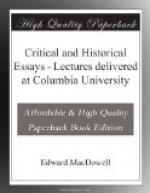He gradually managed to make himself known, and was engaged by Count Morzin, a rich nobleman, to organize an orchestra of about eighteen, which the count retained in his service with Haydn as leader. Here he wrote his first symphony (for strings, two oboes and two horns, in three movements) and a number of smaller works. When he was twenty-nine, Count Morzin gave up his establishment and Haydn entered the service of Prince Paul Esterhazy, in Eisenstadt, Hungary, in the same capacity. Here he had an orchestra of sixteen, composed of good musicians, whom he could call up at any hour of the night to play if he wished, and over whom he had complete control. Although the contract by which he was engaged names the most degrading conditions, and places Haydn on a par with all the other servants, the pay, though small (two hundred dollars yearly), was certain and regular. From this time Haydn was free from the hardships of poverty. His salary was soon increased to five hundred dollars, and he made as much more from his compositions. He wrote over one hundred and twenty-five symphonies, sixty-eight trios, seventy-seven quartets, fifty-seven concertos, fifty-seven sonatas, eight oratorios and cantatas, and nineteen operas, besides innumerable smaller things, for instance, between five hundred and six hundred vocal pieces. His operas, of course, are mere trifles compared with our more modern ones.
His friendship for Mozart is well known. As for his relations with Beethoven, it is probable that their disagreement was merely the effect of pride, and perhaps a certain amount of laziness on one side and youthful bumptiousness on the other. Haydn was returning to Vienna via Bonn, from England, where he had been welcomed by the wildest enthusiasm, when Beethoven called on him to ask for his opinion as to his talent as a composer. It resulted in Beethoven’s going to Vienna. After taking a few lessons of Haydn he went to another teacher and made all manner of contemptuous remarks about Haydn, declaring he had not learned anything from him.
After two highly successful visits to England, in 1792 and 1794, Haydn returned to Vienna and wrote his two celebrated cantatas, “The Creation” and “The Seasons.” His last appearance in public was when he attended a performance of “The Creation” in 1808, at the age of seventy-six. He was received with a fanfare of trumpets and cheers from the audience. After the first part he was obliged to leave, and as he was being carried out by his friends, he turned at the door and lifted his hands towards the orchestra, as if in benediction; Beethoven kissed his hand, and everyone paid him homage. He died during the bombardment of Vienna by the French, May 31, 1809.




